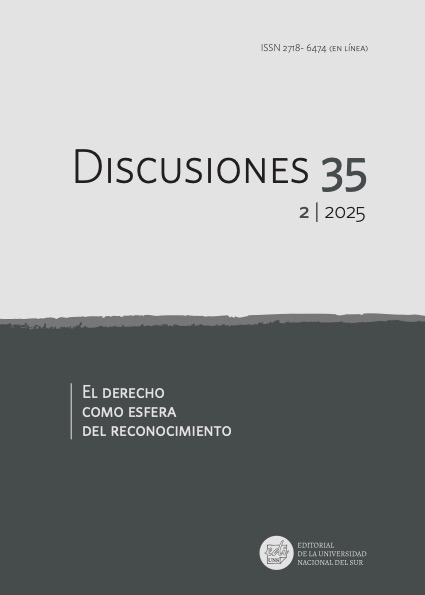Teoría del Reconocimiento como Teoría Crítica, Social y de las Luchas Sociales
Una Aplicación al Análisis Crítico del Trabajo Doméstico Feminizado
DOI:
https://doi.org/10.52292/j.dsc.2025.4615Palabras clave:
Teoría del reconocimiento, teoría crítica, teoría social, trabajo doméstico, principio de igualdadResumen
El artículo presenta la teoría del reconocimiento como una teoría social de la diferenciación de esferas de acción, como teoría de las luchas sociales por el reconocimiento y como teoría crítica. Esta distinción permite identificar, entre otras cosas, el lugar y función de las instituciones y de los principios morales en cada una de esas teorías. Con estas distinciones en mente se estudia el fenómeno del trabajo doméstico feminizado, desde el punto de vista de la relación entre las esferas del amor, del derecho y de la valoración social, mostrando que lo interesante y rico del análisis reside precisamente en la intersección de dichas esferas. De ahí se obtienen ciertas conclusiones útiles a las luchas por el reconocimiento y la teoría crítica de la sociedad. Una de ellas reside en la primacía del principio igualitario, por sobre el del amor y de la valoración social, en el tratamiento crítico de dicho fenómeno.
Descargas
Citas
Adorno, Th. y Horkheimer, M. (1944). Dialektik der Aufklärung, Amsterdam: Querido Verlag.
Allen, A. (2017). The End of Progress: Decolonizing the Normative Foundations of Critical Theory. Nueva York: Columbia University Press.
Basaure, M. (2021). Matrimonio igualitario. Reconstrucción y posición frente a una controversia filosófica, política y jurídica. ALPHA: Revista De Artes, Letras y Filosofía, 1(52), 111-131.
Basaure, M. (2014). Axel Honneth and Luc Boltanski at the Epicentre of Politics. En S. Susen y B. Turner (eds.). The Spirit of Luc Boltanski. Essays on the ‘Pragmatic Sociology of Critique’ (pp. 391-411). Londres: Anthem Press.
Basaure, M. (2011a). In the epicenter of politics: Axel Honneth’s theory of the struggles for recognition and Luc Boltanski and Laurent Thévenot’s moral and political sociology, European Journal of Social Theory, 14(3), 263-281.
Basaure, M. (2011b). Continuity through rupture with the Frankfurt school: Axel Honneth`s theory of recognition. En G. Delanty y S. Turner (eds.), Routledge International Handbook of Contemporary Social and Political Theory (pp. 99-109). Nueva York: Routledge.
Basaure, M. (2011c). Axel Honneth et le multiculturalisme. Droit & Société, 78, 339-353.
Basaure, M. (2009). Foucault et la Psychanalyse. Il faut être juste avec Freud. París: Éditions Le Félin.
Boltanski, L. (2009). De la critique. Précis de sociologie de l’emancipation. París: Gallimard.
Boltanski, L. (1990). L’amour et la justice comme compétences. Trois essais de sociologie de l’action. París: Métaillé.
Bourdieu, P. (1972). Esquisse d’une théorie de la pratique. Ginebra: Droz.
Celikates, R. (2009). Kritik als soziale Praxis. Gesellschaftliche Selbstverständigung und kritische Theorie. Frankfurt/Main-Nueva York: Campus.
Dalla Costa, M. y James, S. (1972). The Power of Women and the Subversion of the Community. Bristol: Falling Wall Press.
Durkheim, É. (1893). De la division du travail social. París: Félix Alcan.
Federici, S. y Fortunati, L. (1984). Grande Calibano: Storia del corpo sociale ribelle nella prima fase del capitale. Milán: Franco Agelini.
Federici, S. (2004). Caliban and the Witch. Brooklyn: Autonomedia.
Folbre, N. (2001). The Invisible Heart: Economics and Family Values. Nueva York: The New Press.
Forst, R. (2007). Das Recht der Rechtfertigung: Elemente einer konstruktivistischen Theorie der Gerechtigkeit. Frankfurt/Main: Suhrkamp.
Habermas, J. (1981). Theorie des kommunikativen Handelns (Vol. 2). Frankfurt/Main: Suhrkamp.
Habermas, J. (1968). Technik und Wissenschaft als Ideologie. Frankfurt/ Main: Suhrkamp.
Hegel, G. (1821). Grundlinien der Philosophie des Rechts. Berlin: Nicolaische Buchhandlung.
Hegel, G. (1807). Phänomenologie des Geistes. Bamberg/Würzburg: Joseph Anton Goebhardt.
Hochschild, A. (1989). The Second Shift. Nueva York: Viking Penguin.
Honneth, A. (2015). Die Idee des Sozialismus. Versuch einer Aktualisierung. Frankfurt/Main: Suhrkamp.
Honneth, A. (2011). Das Recht der Freiheit. Grundriß einer demokratischen Sittlichkeit. Frankfurt/Main: Suhrkamp.
Honneth, A. (1995). Zwischen Gerechtigkeit und affektiver Bindung: die Familie im Brennpunkt moralischer Kontroversen. Deutsche Zeitschrift für Philosophie: Zweimonatsschrift der internationalen philosophischen Forschung, 43(6), 989-1004.
Honneth, A. (1992). Kampf um Anerkennung. Zur moralischen Grammatik sozialer Konflikte. Frankfurt/Main: Suhrkamp.
Honneth, A. y Fraser, N. (2003). Umverteilung oder Anerkennung? Eine politisch-philosophische Kontroverse. Frankfurt/Main: Suhrkamp.
Honneth, A. y Hartmann, M. (2004). Paradoxien des Kapitalismus. Ein Untersuchungsprogramm. Berliner Debatte Initial, 15(1), 4-17.
Horkheimer, M. (1937). Traditionelle und kritische Theorie. Zeitschrift für Sozialforschung, 6(2), 245-294.
Iser, M. (2008). Empörung und Fortschritt: Grundlagen einer kritischen Theorie der Gesellschaft. Frankfurt/Nueva York: Campus.
Kant, I. (1797). Die Metaphysik der Sitten. Königsberg: Friedrich Nicolovius.
Luhmann, N. (1984). Soziale Systeme: Grundriß einer allgemeinen Theorie. Frankfurt/Main: Suhrkamp.
Marcuse, H. (1964). One-Dimensional Man: Studies in the Ideology of Advanced Industrial Society. Boston: Beacon Press.
Merton, R. (1957). Social Theory and Social Structure. NuevaYork: The Free Press.
Parsons, T. (1951). The Social System. Illinois: Free Press.
Rancière, J. (1990). Aux bords du politique. París: Osiris.
Ricœur, P. (2004). Parcours de la reconnaissance. París: Stock.
Rivers, C. y Barnett, R. (2013). The New Soft War on Women: How the Myth of Female Ascendance Is Hurting Women, Men—and Our Economy. Nueva York: Tarcher/Penguin.
Roggerone, S. M. (2025). Justicia y teoría social contemporánea, o el lugar del derecho en la obra de Axel Honneth. Discusiones, 35(2).
Thévenot, L. (2006). L’action au pluriel. Sociologie des régimes d’engagement. París: La Découverte.
Weber, M. (1921). Wirtschaft und Gesellschaft: Grundriss der verstehenden Soziologie. Tübingen: Mohr.
Publicado
Cómo citar
Número
Sección
Licencia
Derechos de autor 2025 Mauro

Esta obra está bajo una licencia internacional Creative Commons Atribución-NoComercial 4.0.
Discusiones no retiene los derechos de reproducción o copia (copyright), por lo que los autores podrán disponer de las versiones finales de publicación para difundirlas.


